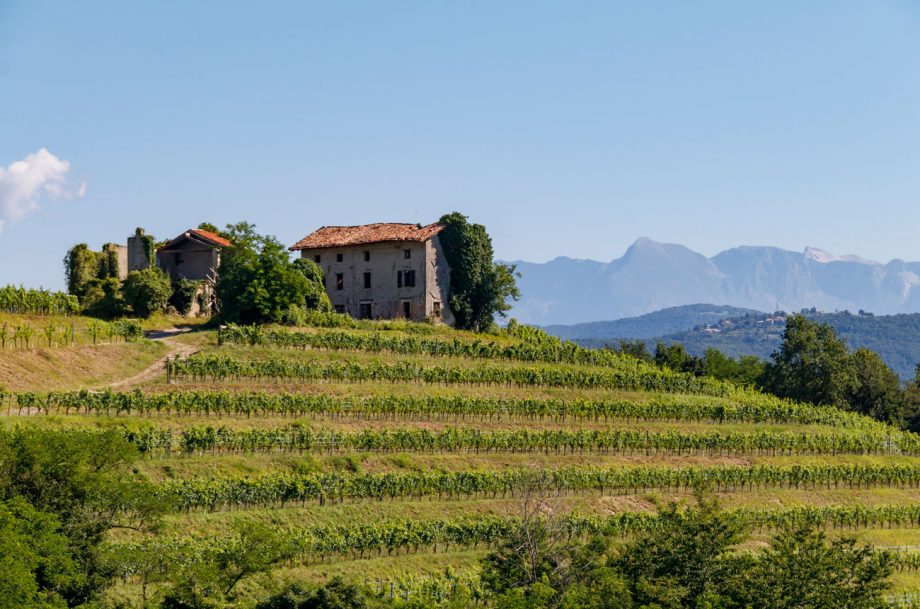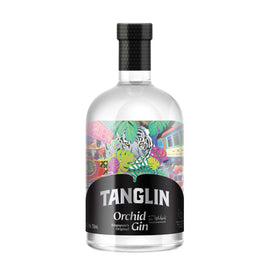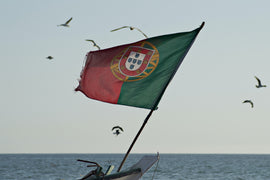I have always been fascinated by places that share borders with other countries. Imagine that the borders weren’t guarded, and you could walk freely between nations: how long would it take you to realize that you were in a foreign country? People move, nothing is static, and yet we share the same needs and dreams. We create states and institutions with the idea of making us safer, and we pretend our nationalities make us different from each other; but a closer look reveals that we are all connected. We are all related. Forgive me for this philosophical digression, and let’s talk about wine.
Friuli-Venezia Giulia is the furthermost northeastern region of Italy and has always been terra di confine, or border land. With Austria to its north and Slovenia to its east, this crossroads between the Balkan and the German territories has a checkered past of allegiances. It was part of the Austro-Hungarian Empire from the middle of the 1800’s until 1919. After the First World War, it became a region of Italy. During Italy’s period of Fascism, Italy expanded this territory by annexing the now-Croatian province of Istria, part of the Dalmatian peninsula. At the end of the Second World War, the territory became a part of Yugoslavia under the Tito regime, and became a bastion against the Communist world through the collapse of the Soviet Union.
Nowadays, the cultural exchanges throughout these regions are fluid; in peacetime, it’s easier to see how very similar we all are to each other. This is especially true of the wine world. Take for example some of the grape varietals of Friuli. Vitouska, a white varietal from Slovenia, is cultivated as well in Friuli. The same is true for white grapes like Malvasia, Istriana, and Friulano (formerly known as Tocai Friulano), and for red grapes like Terrano or Kraški Teran in Slovenia, or Franconia, known as Blaufränkisch in Austria and Limberger in Croatia.
All of these reveal that even though we use different words in different languages, we talk about the same things. And another fact is true: wine always brings people together; it doesn’t matter where they are from.
Vin e amîs, un paradîs (to have wine and friends is paradise) – Friulan proverb
Specogna, Pinot Grigio, Friuli Colli Orientali DOC 2019
About the Winery:
Everything started with Leonardo Specogna and his wife, Alma. After residing in Switzerland as ex-pats for years, the couple returned to Friuli Venezia Giulia in 1963 and bought a small plot of land on the hills of Rocca Bernarda in Corno di Rosazzo.
This eastern part of Friuli has been used for viticulture since Roman times, as it features ideal vine growing conditions. In the North, the Carnic and Julian Alps protect the area from cold Northern European winds, while the Adriatic in the South mitigates the warmer temperatures. The area also has high diurnal temperature variation; this means the difference between daytime and nighttime temperature is dramatic, which is essential to building aromas in the wine. The estate comprises 20 hectares of vineyards situated on the hills, 100 to 200 meters above sea level, many of which are 40 to 50 years old.
Today, the family tradition is kept alive by the third generation of winemakers, Cristian and Michele Specogna.
The Specognas exclusively practice organic farming, and moreover participate in the project VTS (Vini di Territorio Sostenibili) or Wines of Sustainable Territories. This project works to eliminate the use of synthetic insecticides and fungicides (and their environmental impacts) by growing expertise in sustainable farming among vintners. Specogna also owns a small nursery where they grow clones in danger of extinction.
About the Winemaking:
100% Pinot Grigio from over 30-year-old vines planted on marl, sandstone and clay soil.
Fermentation and refinery: 48 hours of maceration at low temperature – in this phase the wine obtains its particularly coppery color. Racking and fermentation with indigenous yeasts occurs in stainless tanks. 20% of the wine is aged in oak barrels of 1500 liters, while the remaining 80% ages in steel tanks. After eight months the two parts are blended and bottled.
Tasting Notes:
Onion skin in color, typical of the varietal. The nose offers a mineral salinity with a recollection of stony fruits like plum and pluot. Clean with a tingly acidity that makes for a pleasant aperitif and a good complement to many food preparations.
Bortolusso, Franconia, Trevenezie IGT 2019
About the Winery:
Emiro Bortolusso, Sergio and Luca’s father, founded the winery in 1976. The estate is located in Udine province, inside the Carlino district. The land is unique, the vineyard merges into the Marano Lagoon, and the grapes’ roots grasp the mixed sea soil, giving the wine a characteristic flavor.
The lagoon is characterized by marshy vegetation, and by the unique temporary settlements of fishermen, the typical "casoni", buildings made of bamboo and wood that make the Marano Lagoon one of the most interesting places in the Upper Adriatic. The grapes from this particular environment receive two sources of light: from the sun, and from the sun’s reflection in the water. The wind and saline breeze keep the grapes dry, preventing molds and other parasites, impacting the fruits with unique perfumes and flavors.
About the Winemaking:
This wine is made of 100% Franconia grape varietal.
Organic fertilizer and minimal pesticide intervention are used in the vineyards.
In the cellar modern and automated technologies are used for the winemaking process such as stainless tanks with heat control in a safe and clean environment. The ageing area is located under the sea level, with stable heat and humidity all year round.
Grapes are soft-pressed and the must is allowed to ferment for about 15 days at a controlled temperature with an inoculum of enzymes and cultured yeasts in stainless steel tanks.
Tasting Notes:
Light garnet in the glass. Violet and wild flowers, small berries and bing cherry are the most dominant sensations at the olfactory analysis. It brings a fragrant fruitiness with floral nuances to the palate. Surprisingly complex in an approachable frame.





